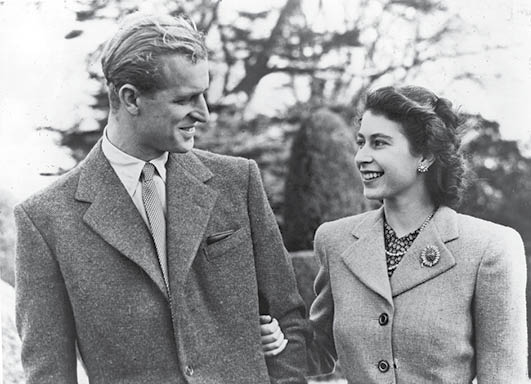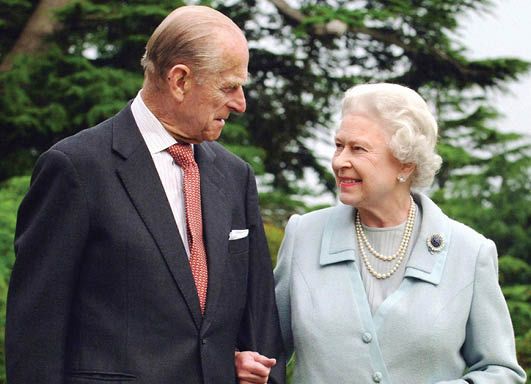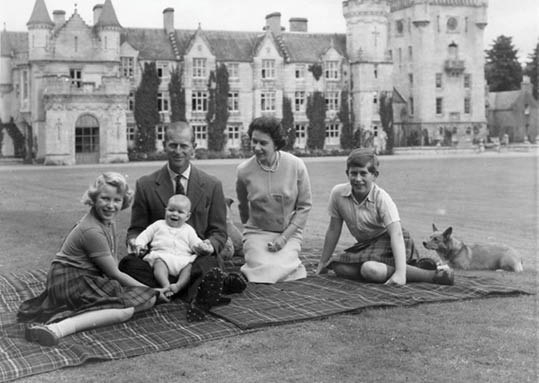Prince Phillip: A Tribute
 “It is with deep sorrow hat Her Majesty, The Queen, has announced the death of her beloved husband, His Royal Highness – The Prince Philip, Duke of Edinburgh. His Royal Highness passed away peacefully this morning at Windsor Castle,” was the announcement posted outside the Buckingham Palace on 9th April, 2021. HRH Prince Phillip was ninety-nine, just two months shy of his hundredth birthday. Born on 10th June, 1921, at the royal holiday residence on the Island of Corfu, Greece, on the Kitchen table there, as Prince Phillip Schleswig-Holstein-Sonderburg-Glucksburg of Greece and Denmark. His father was Prince Andrew of Greece and Denmark and his mother, Princess Alice belonged to the German Battenberg (name later changed to the Anglicized ‘Mountbatten’) family. She was the great grand-daughter of Queen Victoria. He was their youngest child and their only son.
“It is with deep sorrow hat Her Majesty, The Queen, has announced the death of her beloved husband, His Royal Highness – The Prince Philip, Duke of Edinburgh. His Royal Highness passed away peacefully this morning at Windsor Castle,” was the announcement posted outside the Buckingham Palace on 9th April, 2021. HRH Prince Phillip was ninety-nine, just two months shy of his hundredth birthday. Born on 10th June, 1921, at the royal holiday residence on the Island of Corfu, Greece, on the Kitchen table there, as Prince Phillip Schleswig-Holstein-Sonderburg-Glucksburg of Greece and Denmark. His father was Prince Andrew of Greece and Denmark and his mother, Princess Alice belonged to the German Battenberg (name later changed to the Anglicized ‘Mountbatten’) family. She was the great grand-daughter of Queen Victoria. He was their youngest child and their only son.
The young prince had a turbulent childhood. He was just over a year old when his father was sent into exile in 1922 due to defeat in the war against Turkey. King George V helped his cousin, Prince Andrew, to flee with his family to Italy aboard a British warship. The exiled family settled outside Paris at St. Cloud and the young Prince Phillip attended the American school, ‘The Elms’, where he was described as, “a know-it-all smarty person, but always remarkably polite.”
In 1930, yet again his world turned topsy-turvy as his mother suffered a severe mental breakdown and was diagnosed with schizophrenia. Prince Phillip spent years moving from one country to another till he was sent to the Gordonstoun school, situated in the Scottish Highlands, in September 1934, at the age of thirteen. Gordonstoun provided its students the opportunity for self-discovery, liberating them from the wealthy and powerful families from the ‘enervating sense’ of privilege and entitlement. Though many regarded the education system there too Spartan, it suited the adventurous Prince Phillip well. He left Gordonstoun in early 1939 to join the Royal Naval College at Dartmouth and graduated a year later from Dartmouth, excelling as the best cadet of his course. He joined the Royal British Navy as a midshipman in 1940 and was commissioned as Sub-lieutenant on 1st February, 1941. During the Second World War Phillip fought for the British forces, whereas his two brothers-in-law fought for Germany.
 During the tour of the Royal Naval College, Dartmouth of King George VI and Queen Elizabeth, the Queen and Lord Louis Mountbatten, the first Earl Mountbatten of Burma, asked his nephew Phillip to escort the king’s two daughters – 13-year-old Princess Elizabeth and Princess Margret aged nine. The Royal sisters were his third cousins through Queen Victoria. Many believe it was love at first sight for the Heir Apparent and the Prince of Greece. As a girl of 19, Princess Elizabeth wrote, “Just met a devastatingly attractive young giant who caused my heart to flutter a bit.” Eventually, sometime in 1946, Philip asked the King for his daughter’s hand in marriage. The enamoured couple wanted to get married immediately in 1945. King George agreed but asked the couple to wait till Elizabeth was twenty-one. After a courtship of eight years, the couple was united in marriage at the Westminster Abbey on 24th November, 1947. Princess Elizabeth was the tenth member of the Royal Family to be married at the Abby.
During the tour of the Royal Naval College, Dartmouth of King George VI and Queen Elizabeth, the Queen and Lord Louis Mountbatten, the first Earl Mountbatten of Burma, asked his nephew Phillip to escort the king’s two daughters – 13-year-old Princess Elizabeth and Princess Margret aged nine. The Royal sisters were his third cousins through Queen Victoria. Many believe it was love at first sight for the Heir Apparent and the Prince of Greece. As a girl of 19, Princess Elizabeth wrote, “Just met a devastatingly attractive young giant who caused my heart to flutter a bit.” Eventually, sometime in 1946, Philip asked the King for his daughter’s hand in marriage. The enamoured couple wanted to get married immediately in 1945. King George agreed but asked the couple to wait till Elizabeth was twenty-one. After a courtship of eight years, the couple was united in marriage at the Westminster Abbey on 24th November, 1947. Princess Elizabeth was the tenth member of the Royal Family to be married at the Abby.
WWII had ended just two years before the marriage and it was not acceptable to invite any of the Duke of Edinburg’s German relatives, including the Duke’s three sisters who had married German Princes. Before the wedding, Prince Phillip renounced all his old titles and adopted his mother’s British surname becoming ‘Lieutenant Phillip Mountbatten’. The day before the marriage, King George conferred upon him the dignity – ‘Royal Highness’. On the morning of the marriage, he was made the Duke of Edinburgh, Earl Marioneth and Baron Greenwich. He was earlier dubbed the Knight of the Order of the Garter. He was now His Royal Highness Sir Phillip Mountbatten. Their marriage has become the longest surviving marriage of any British monarch and probably any other monarch in the world.
 The couple lived at Clarence House. After their honeymoon at Broadmoor, Prince Phillip returned to the navy. Prince Charles was born in 1948 and Princess Anne in 1950, when King George VI was alive. In 1950, he was posted in Malta where he received the command of the frigate HMS Magpie. His active service in the navy ended in July 1951.
The couple lived at Clarence House. After their honeymoon at Broadmoor, Prince Phillip returned to the navy. Prince Charles was born in 1948 and Princess Anne in 1950, when King George VI was alive. In 1950, he was posted in Malta where he received the command of the frigate HMS Magpie. His active service in the navy ended in July 1951.
On 6th February, 1952, the Edinburghs were in Kenya at the famous treetops Hotel when the Princess received news of her father’s demise. Prince Phillip broke the news to her. Princess Elizabeth was now Her Majesty Queen Elizabeth II.
Now arose the question of the name of the royal house to which the new queen would like to be known! Lord Mountbatten was of the opinion it should be ‘Mountbatten’. Prince Phillip suggested House of Edinburgh, as she was the Duchess of Edinburgh. The queen’s grandmother – Queen Mary of Teck, a staunch supporter of the royal traditions, called up PM Sir Winston Churchill who advised the queen to continue with the old name, the ‘House of Windsor’ by making a proclamation to the effect. Aggrieved and offended, Prince Phillip is said to have commented, “I’m nothing but a bloody amoeba! I’m the only man in the country not allowed to give his name to his own children!” Queen Mary of Teck angrily replied, “What does that damn fool Edinburgh think that the family name has got to do with him?” It was only in 1960 when Queen Mary died and Sir Winston was no more the PM, that the Queen issued an order in Council that the surname of Mounbatten-Windsor became the surname of the queen, her husband and all the male-line descendants who do not have the titles of prince, princess or the style of Royal Highness.
Even during the queen’s coronation, Philip met with a lot of opposition, especially from Queen Elizabeth, the Queen Mother and Sir Winston Churchill. The Queen Mother called him ‘the Hun’ because of his Battenburg lineage. While King George may have had a ‘copybook’ coronation, Prince Phillip, the chairman of the Coronation Commission had some radical Ideas. He wanted the coronation ceremony to be filmed and televised for all Britain to see. BBC reported that PM Churchill was horrified at the thought of using cameras inside the sacred Westminster Abby, as it wasn’t the ‘right and proper’ thing to do, saying, “It would be unfitting that the whole ceremony, not only in its secular but also in its religious and spiritual aspects, should be presented as if it were a theatrical performance!” Somehow, Prince Phillip had his way and thanks to him, even today we can watch the coronation of QEII as a beautiful historical document. The movie, ‘The Queen is Crowned’ was screened at the Excelsior Theater in Mumbai, in 1953.
 Prince Philip was an extraordinary man who led an extraordinary life. He was consort of Queen Elizabeth II, a peer and a prince of the United Kingdom but was not titled as Prince Consort. He walked two steps behind the Queen. He was a true Royalist and would never do anything to bring disrepute to the crown. During the coronation ceremony he had knelt before her as his sovereign and swore to be her as ‘liege man of life and limb’.
Prince Philip was an extraordinary man who led an extraordinary life. He was consort of Queen Elizabeth II, a peer and a prince of the United Kingdom but was not titled as Prince Consort. He walked two steps behind the Queen. He was a true Royalist and would never do anything to bring disrepute to the crown. During the coronation ceremony he had knelt before her as his sovereign and swore to be her as ‘liege man of life and limb’.
On 19th February, 1960, Prince Phillip became the father to a second son and the third child – Prince Andrew, the Duke of York and on 10th March, 1964 he became father to his third son – Prince Edward, the Earl of Wessex. All his life, he supported his wife in her duties as the queen. He retired from his royal duties in 2017. The then PM, Theresa May, described it as ‘a remarkable lifetime service.’
On 20 November, 2017, the Mountbatten-Windsors celebrated their 70th wedding anniversary, which made Queen Elizabeth II the first British monarch to celebrate a platinum wedding anniversary! Prince Phillip was a glob-trotter, and probably one of Britain’s most travelled people! He was the first member of the Royal family to make an expedition to the Arctic in 1956 in the newly commissioned HMY Britannia, which he also sailed across the Antarctica. The Royal couple visited India in 1961.
The Duke of Edinburgh was an avid sportsman and an equestrian and he helped develop carriage riding as a sport. As a polo enthusiast, he had a fair amount of falls but retired only due to his arthritis which posed difficulty in swinging the mallet. He was also a fine swimmer and a competitive sailor. Once, the great Don Bradman had jokingly said, “He should have been considered by the selectors to play cricket for England!” He was not the man for half-measures, he did everything wholeheartedly. He was the President / patron of over 800 organisations that included, sports, business organizations and social and cultural organizations; the most important being the Duke of Edinburgh Award – a self-improvement program for the youth. Environmental projects were very close to his heart.
Prince Phillip was known for his naughty pranks and quips and a great sense of humour; he loved speaking his mind. His remark “Slity eyes” made the Chinese very angry! He said, “If a man opens the door for a woman, it means it is either a new car or a new wife!” On the occasion of her Diamond Jubilee in 2012, the Queen referred to Prince Philip as her “constant strength and guide.” That he was.
In his later years, the Duke spent most of his time at the secluded, five-bedroom Wood Farm in Wolferton, Norfolk, on the Queen’s Sandringham estate. Prince Philip wanted to die in the comforts of his own home — a last wish that came true, as he passed away ‘peacefully’ at Windsor Castle, his residence, following a nearly month-long stay in the hospital for heart problems. Earlier in February, he was hospitaled for heart surgery before being released on March 16, which marked his last public appearance.
He had requested for a funeral with the least of fuss. He wanted the members of the public to view his coffin but due to the ongoing coronavirus pandemic, he will lie in rest at the private chapel at the Windsor Castle, till the day of his formal funeral – 18th April, 2021. It will not be a State Funeral.
His Royal Highness Prince Phillip, the Duke of Edinburgh is no more. It is a great loss to Great Britain. One might not see the likes of him in a long time to come. When he is finally laid to rest, there will surely be many moist eyes the world over.
- Adarji Angrez! - 16 March2024
- V-Day – The D-Day! - 10 February2024
- Eighteen Going On Eighty! - 13 January2024
